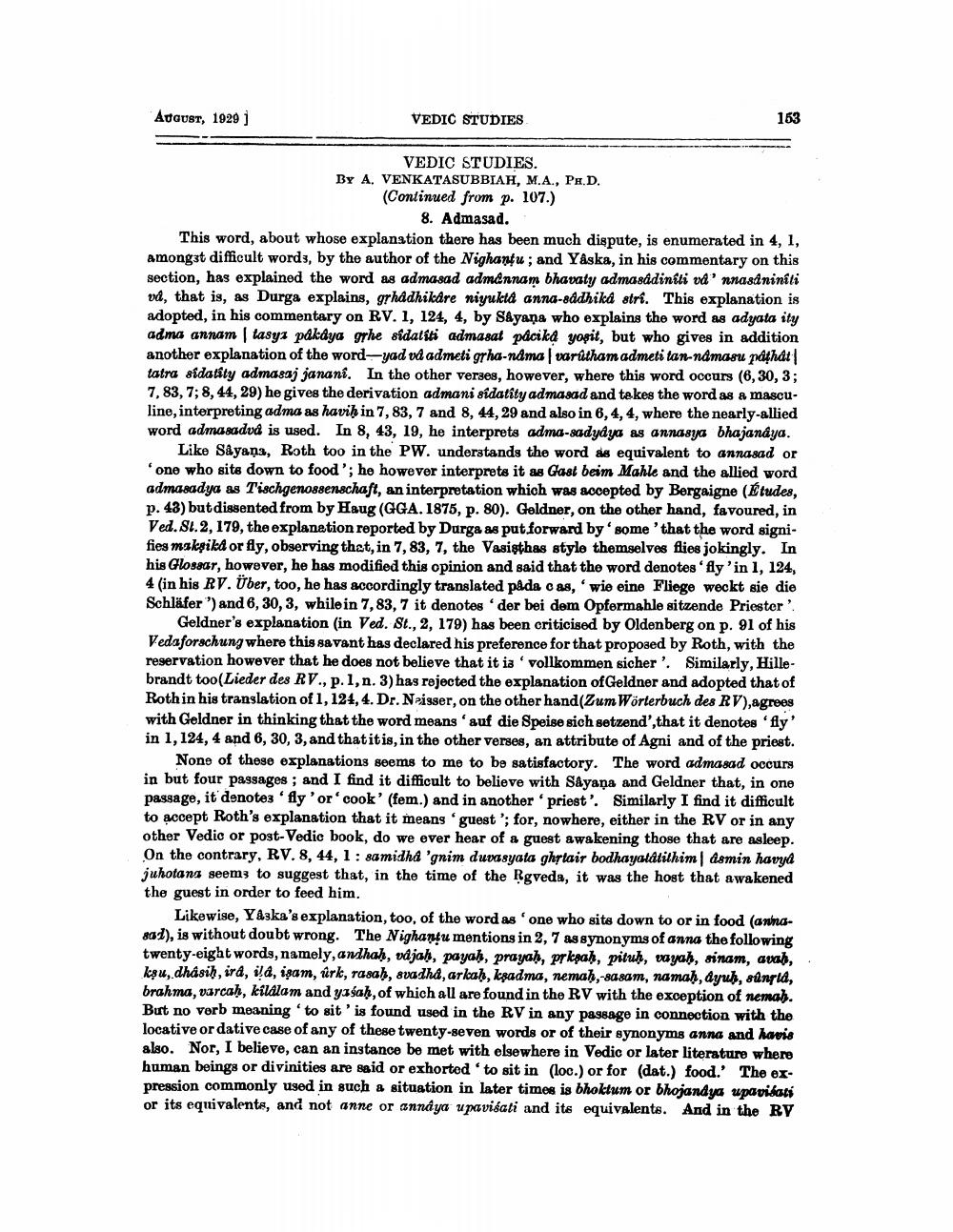________________
August, 1929 ]
VEDIC STUDIES
163
VEDIC STUDIES. BY A. VENKATASUBBIAH, M.A., P.D. (Continued from p. 107.)
8. Admasad. This word, about whose explanation there has been much dispute, is enumerated in 4, 1, amongst difficult words, by the author of the Nighantu; and Yaska, in his commentary on this section, has explained the word as admasad admennam bhavaty admasddiniti ud' nnaadniniti vd, that is, as Durga explains, grhadhikare niyukta anna-oddhikå stri. This explanation is adopted, in his commentary on RV. 1, 124, 4, by Sayana who explains the word as adyata ity adma annam | tasyı påkâya ghe sidatiti admasat påcika yoșit, but who gives in addition another explanation of the word-yad ud admeti grha-ndma | varitham admeti tan-ndmasu pdthat tatra sidatity admasaj janani. In the other verses, however, where this word occurs (6, 30, 3; 7, 83, 7; 8, 44, 29) he gives the derivation admani sidatity admasad and te kes the word as a masculine, interpreting adma as havih in 7, 83, 7 and 8, 44,29 and also in 6,4,4, where the nearly-allied word admasadvd is used. In 8, 43, 19, he interprets adma-sadydya as annasya bhajandya.
Like Sâyana, Roth too in the PW. understands the word as equivalent to annasad or one who site down to food '; he however interprets it as Gast beim Mahle and the allied word admasadya as Tischgenossenschaft, an interpretation which was accepted by Bergaigne (Etudes, p. 43) but dissented from by Haug (GGA. 1875, p. 80). Geldner, on the other hand, favoured, in Ved. Sl.2, 179, the explanation reported by Durga as put forward by some 'that the word signifies maksikd or fly, observing that, in 7, 83, 7, the Vasisthas style themselves flies jokingly. In his Glossar, however, he has modified this opinion and said that the word denotes 'fly'in 1, 124, 4 (in his RV. Über, too, he has accordingly translated pada cas, 'wie eine Fliege weckt sie die Schläfer ') and 6, 30, 3, while in 7,83, 7 it denotes der bei dem Opfermahle sitzende Priester '.
Geldner's explanation (in Ved. St., 2, 179) has been criticised by Oldenberg on p. 91 of his Vedaforschung where this savant has declared his preference for that proposed by Roth, with the reservation however that he does not believe that it ia' vollkommen sicher'. Similarly, Hillebrandt too(Lieder des RV., p. 1, n. 3) has rejected the explanation of Geldner and adopted that of Roth in his translation of 1, 124, 4. Dr. Neisser, on the other hand(Zum Wörterbuch des RV),agrees with Geldner in thinking that the word means auf die Speise sich setzend', that it denotes 'fly' in 1, 124, 4 and 6, 30, 3, and that itis, in the other verses, an attribute of Agni and of the priest.
None of these explanations seems to me to be satisfactory. The word admasad occurs in but four passages ; and I find it difficult to believe with Sayana and Geldner that, in one passage, it denotes 'fly 'or'cook' (fem.) and in another priest'. Similarly I find it difficult to accept Roth's explanation that it means ' guest'; for, nowhere, either in the RV or in any other Vedic or post-Vedic book, do we ever hear of a guest awakening those that are asleep. On the contrary, RV. 8, 44, 1: 8amidha 'gnim duvasyata ghflair bodhayatatithim asmin havyd juhotans seems to suggest that, in the time of the Rgveda, it was the host that awakened the guest in order to feed him.
Likewise, YAşka's explanation, too, of the word as one who sits down to or in food (anna801), is without doubt wrong. The Nighantu mentions in 2, 7 as synonyms of anna the following twenty-eight words, namely, anihah, od jah, payah, prayah, prkpah, pituh, vayah, sinam, aral, kşu, dhasih, ira, id, igam, úrk, rasah, svadha, arkaḥ, ksadma, nemah,-8a8am, namah, dyuh, sunpid, brahma, varcah, kilalam and yasah, of which all are found in the RV with the exception of nema). But no vorb meaning 'to sit' is found used in the RV in any passage in connection with the locative or dative case of any of these twenty-seven words or of their synonyms anna and havis also. Nor, I believe, can an instance be met with elsewhere in Vedic or later literature where human beings or divinities are said or exhorted 'to sit in (loc.) or for (dat.) food.' The expression commonly used in such a situation in later times is bhoktum or bhojandya upavidati or its equivalents, and not anne or anndya upavisati and its equivalents. And in the BY




